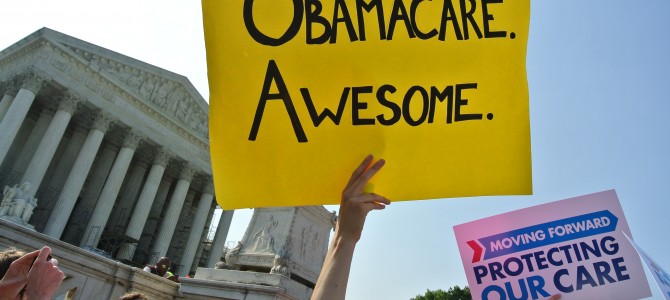
At a press conference at G-7 summit in Germany, Barack Obama touched on the Supreme Court’s imminent King v. Burwell decision. “This should be an easy case,” he explained. “Frankly, it probably shouldn’t even have been taken up.” Obama went on to contend that it’s safe to assume SCOTUS will concur with “most legal scholars” and “play it straight.”
Not a surprise. Most legal scholars, most economists (sorry, “every economist“), and all—but the most oil-drenched—scientists can find unanimity on one critical matter: Obama is right.
And when his policies are legally threatened, liberal forces will typically mobilize to smear courts as Koch-funded partisan cells plotting to negate all progress. And no challenge has provoked a wall of fabricated anger quite like the debate around the King v. Burwell. Left-partisan punditry continues to act like millions could lose insurance subsidies because of a mere “typo” rather than a major discrepancy embedded in a massive reform law that, at the very least, deserves some scrutiny from the courts.
That seems to also be what The Washington Post seems to believe. According to a new WaPo-ABC News poll, Americans oppose the Democrats’ health-care insurance reform, 54 to 39 percent. Yet, by a margin of 55-38 percent, more people say the court should not take action to block federal subsidies in states that didn’t set up own exchanges. This led the Michael Hiltziks of the world to declare that “Americans want to save Obamacare.”
This seems like a contradictory message – until you discover how WaPo frames the question:

Chew over the absurdity and bias of that query (it’s worse when you dig deeper). For starters, it has absolutely nothing to do with the legality or constitutionality of the Obamacare challenge – the reason the case is in the courts. It’s about the theoretical consequences should the court side with the challengers.
What do you think would happen if you asked voters about something pertinent to the law? For instance:
Q: The U.S. Supreme Court is deciding the legality of the administration’s policy of handing out subsidies to millions of Americans though no such provision had ever appeared in the Affordable Care Act. Do you believe the executive branch should be allowed to dispense taxpayer funds in any way it sees fit whenever it feels like it, or should it be compelled to follow the law?
That’s just as accurate as the WaPo-ABC News question, though perhaps the polling numbers would look a bit different. Or how about this:
Q: The U.S. Supreme Court is deciding a case that could undermine the Obama administration’s health-care reform and, ultimately, allow states to set up their own systems and deal with health-care insurance on the local level. Do you believe the court should or should not allow them to do this?
The Fix used this headline to report on the poll: “Public to Supreme Court: Don’t gut Obamacare.”
Believe it or not, the question of gutting Obamacare has not yet been heard by the court. And this poll—and most of the coverage—makes the erroneous assertion that a victory for challengers would inevitably “gut” Obamacare. It’s not the court’s job to ascertain what the political future of the law is, and there is no reason why Washington can’t “fix” Obamacare by offering subsidizes to states that chose not to participate in the exchanges. In fact, Republicans already have more than one proposal to fix Obamacare.
Actually, why doesn’t WaPo-ABC News poll ask this question?:
Q: The U.S. Supreme Court is deciding a case that would temporarily block federal subsidies that help some low and moderate income Americans pay for their health insurance. But Republicans have a plan to renew those subsidies immediately and, at the same time, repeal the Individual Mandate. Should the Obama administration take that deal?
If we asked voters that question and The Fix would be forced to run with the headline: “Public to Supreme Court: Get Rid Of The Individual Mandate.”
There is a prevalent counterpart to the “typo” argument among liberals. The Supreme Court, they contend, must contemplate the political implications of their decision. “Since we’ve built something as intrusive and wide-ranging as possible, you can never touch it because too many people will be hurt and the fallout would be terrible.” Maybe they’re right (although I doubt it). The Supreme Court is not in the fortune telling business. There’s no evidence that most voters want to save the law. It wouldn’t matter even if they did. It exists to check democratic forces when they overstep their role.
This week, Supreme Court struck down a disputed law that would have allowed Americans born in Jerusalem to list their birthplace as Israel on their passports. The State Department refuses to identify Jerusalem as the capital of Israel for obvious political reasons. Now, a person can believe that this policy is both ludicrous and unhelpful and at the same time recognize that SCOTUS’s decision preserving the Constitution’s distribution of foreign policy power makes a lot of sense. Because it’s possible to detach your feelings about specific laws from a constitutional process. Or, at least, it should be.
These days, only half of Americans “trust” that Supreme Court will do the right thing on health care, according to a new CNN/ORC poll. The question is, trust them to do what? To do their jobs and weigh the legality of the law, or to work backwards from the notion that nothing is more critical to the American experience than protecting this contentious, unpopular piece of legislation? We already know what the president thinks. But we still don’t know what Americans believe.







